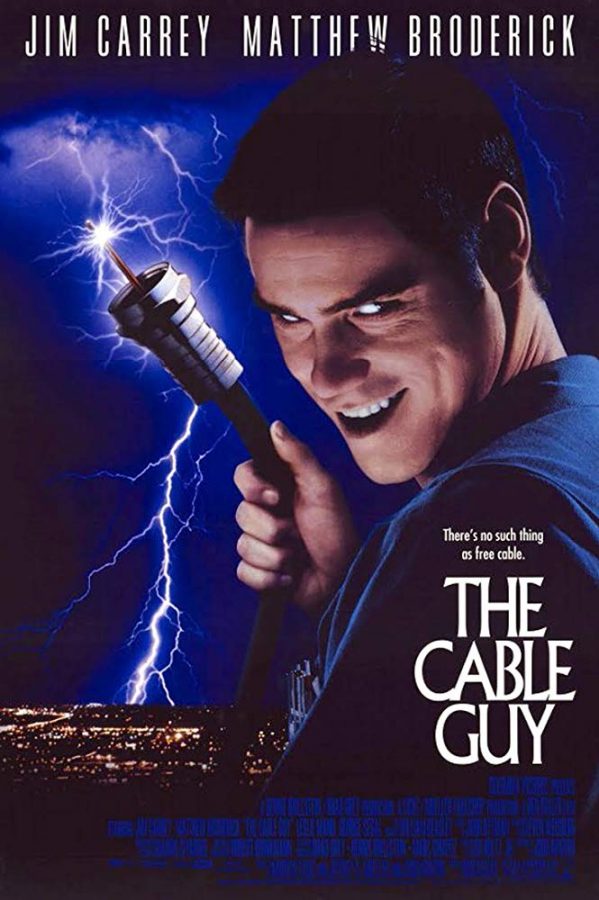Opinion | ‘The Cable Guy’ was ahead of its time
Jim Carrey poses as Chip, a cable provider, in the 1996 movie, “The Cable Guy.” Columnist Dylan discusses how the critique of media in “The Cable Guy” can be applied to modern times, more than 20 years after the movie was created.
Jan 30, 2020
Jim Carrey is one of America’s most well-known comedic actors. His career spans decades, and his range of films includes not only dumb comedies, like “Bruce Almighty,” but also some rather thoughtful dramas, like “The Truman Show.”
But there is one film in particular that exists on a pendulum, swinging back and forth between these two in a way that conveys an uncomfortable and darkly humorous story of modern life. While on the surface it is a typical, if not disjointed, black comedy, there is actually much more here.
This movie is 1996’s “The Cable Guy.” The story of “The Cable Guy” follows Jim Carrey as “Chip,” a psychotic cable provider who offers his clients free cable (back when that was actually important to people) in exchange for being his friend. However, Chip is incredibly obsessive and has little concept of boundaries. He stalks his customers and interferes with their lives if they attempt to “leave” him.
He later displays violent and unstable tendencies, culminating in a final confrontation that reveals Chip is a fake name adopted from an old television show, and, in fact, he adopts many TV-based monikers and never reveals his real name. Finally, it is left ambiguous whether or not Chip is reformed at the end, implying he isn’t.
Truly, “The Cable Guy” is an incredibly cynical, poignant and succinct indictment of the modern media environment. For this reason, the film was disturbingly ahead of its time, which led to a relatively lukewarm critical reception. The comedy, at times, falls flat, and the casting was far from ideal, but Carrey’s role as the antagonist (or perhaps deuteragonist) is brilliant.
Get The Daily Illini in your inbox!
Chip was raised by a single, working mother who didn’t have much time to spend with her son. So in lieu of a bond with another person, Chip watched vast amounts of television. This overexposure to mass media from such a young age warped him. He failed to distinguish reality from TV dramas and had difficulty forming a healthy relationship due to his lack of foundation for this at a formative age.
Lost in a sea of imagined and parasocial relationships, Chip grasps desperately for a genuine connection, unable to find it in his family. This leads to his violent and irrational behavior. One of the key elements of any TV sitcom is a relatively low-stakes world in which people get along and have close relationships. To Chip, this was the real world, and he sought endlessly to achieve it. For this reason, Chip is a tragic hero and the secondary protagonist of the film.
Chip represents the modern person. In the digital age, we all grow up surrounded by media attempting to sell us a fake life. These are influencers, YouTubers, television shows, advertisements, podcasts, etc. Children are exposed to digital media at a younger age than ever before and are thrust into a world they may not be ready to cope with or understand. Studies have produced varied conclusions on the effects of media on children, but overexposure is shown to cause low self-esteem, anxiety and feelings of alienation.
While at the time, Chip’s overexposure to media seemed ridiculous, it is fast becoming the norm. Of course, this doesn’t mean everyone in the future will become a murderer or that media is altogether bad for children, but the critiques “The Cable Guy” levies are as cogent today as ever. Genuine human connection is crucial for a developing mind and even for adults. No amount of parasocial relationships can fill that void.
Crucial to Chip’s character is the reality that Chip is, in fact, not his name but is taken from a TV show — “My Three Sons,” to be exact. This not only represents Chip’s inability to distinguish himself from the TV he was watching but also the loss of identity faced by a person alienated from the people around them. In the digital age, we are all Chip.
“The Cable Guy” may not be the smartest, punchiest or most avant-garde film of all time. In fact, it may not even be particularly good if it is viewed through the lens of a typical comedy. But when read as a critique of the modern media world 20 years before its time, the beauty of the film is much more pronounced. Media saturation is dangerous, and living outside of the fabricated world is important to our psychological adjustment.
Dylan is a junior in Media.






